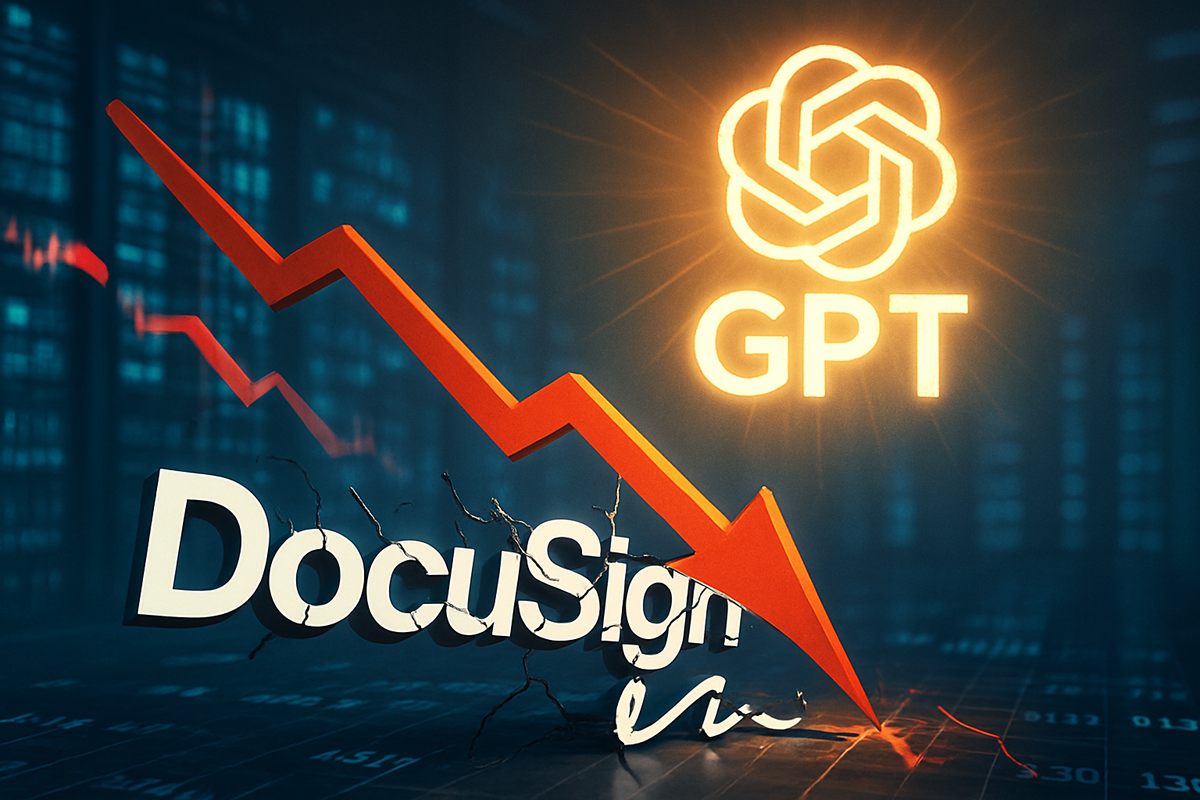
DocuSign (NASDAQ: DOCU), the leading electronic signature and agreement management company, saw its shares plummet by a staggering 11.8% in afternoon trading on September 30, 2025. The sharp decline was triggered by the unveiling of DocuGPT, a new artificial intelligence-powered product from OpenAI. This unexpected entry into the document automation space by the AI giant has sent shockwaves through the market, raising serious questions about DocuSign's future competitive landscape and its long-held dominance in the agreement management sector. Investors are now grappling with the potential for a formidable new rival to disrupt a market that DocuSign has largely defined.
OpenAI's DocuGPT: A Direct Challenge to Agreement Management
The catalyst for DocuSign's dramatic sell-off was the launch of DocuGPT by OpenAI, a move that Bloomberg Intelligence analysts have already dubbed a potential "formidable competitor" in the agreement-management sector. DocuGPT is not merely another e-signature tool; it represents a significant leap in AI-driven document processing and automation, directly targeting the sophisticated contract lifecycle management that DocuSign's Agreement Cloud and Intelligent Agreement Management (IAM) platforms aim to provide.
OpenAI's DocuGPT is engineered to transform raw, unstructured contracts into organized and searchable data formats. This capability directly challenges DocuSign's own efforts to leverage AI for extracting and searching contract details, as seen in its Navigator feature. Furthermore, DocuGPT boasts impressive data extraction and classification abilities, capable of instantly classifying, reading, and extracting structured data from various document types with high accuracy, potentially reaching 100%. This level of precision and automation in converting unstructured legal documents into actionable, structured data poses a direct threat to the manual and semi-automated processes still prevalent in many existing agreement workflows.
The new OpenAI offering also extends to robust workflow automation and data entry, automatically populating systems of record with extracted data, thereby streamlining document-centric processes. This directly competes with the broader automation objectives of DocuSign's platform. Moreover, DocuGPT offers real-time information retrieval and summarization, allowing users to interact with documents to locate specific information quickly and generate reports and summaries. This advanced analytical capability could significantly reduce the need for extensive manual review, a cornerstone of many existing legal and business operations that rely on DocuSign's ecosystem. Leveraging OpenAI's cutting-edge large-scale generative AI models, DocuGPT can handle complex document automation challenges through zero-shot, few-shot, and one-shot learning, enabling a deep understanding of the nuanced language and code found in intricate legal agreements. This technological prowess suggests a highly adaptive and intelligent system capable of disrupting established methods of contract management.
Winners and Losers in the AI-Driven Document Wars
The immediate fallout from OpenAI's DocuGPT launch clearly positions DocuSign (NASDAQ: DOCU) as a primary short-term loser. The 11.8% stock plunge reflects investor concern that its long-standing market leadership in electronic signatures and agreement management is now under direct and significant threat. DocuSign has invested heavily in its Intelligent Agreement Management (IAM) platform, aiming to use AI to streamline contract workflows. However, DocuGPT's advanced capabilities in document understanding, data extraction, and automation could diminish the competitive edge DocuSign has sought to build, potentially leading to slower growth, increased customer churn, or the need for substantial R&D investment to keep pace. The company's valuation, which has historically commanded a premium due to its dominant market position, may now face sustained pressure as the competitive landscape intensifies.
Conversely, OpenAI stands as the clear winner in this scenario. The launch of DocuGPT not only expands its product portfolio beyond its foundational large language models but also establishes it as a serious contender in the enterprise software market, specifically in legal technology and agreement management. This move diversifies OpenAI's revenue streams and showcases the practical application of its advanced AI research, potentially attracting new enterprise clients and further solidifying its position as an AI innovation leader. The successful deployment of DocuGPT could also pave the way for OpenAI to enter other document-heavy industries, unlocking vast new market opportunities.
Beyond these two direct players, other companies in the broader legal technology and document automation sectors could experience ripple effects. Smaller, niche AI-powered contract analysis tools might find themselves squeezed between the established player (DocuSign, even if challenged) and the powerful new entrant (OpenAI). However, companies that provide complementary services or integrate with various AI platforms might see opportunities. For instance, cloud infrastructure providers like Amazon Web Services (NASDAQ: AMZN), Microsoft Azure (NASDAQ: MSFT), or Google Cloud (NASDAQ: GOOGL) could benefit from increased demand for computational resources as more companies adopt sophisticated AI tools like DocuGPT. Additionally, enterprises specializing in AI consulting or integration services might see a surge in demand as businesses seek to implement or adapt to these new AI-driven document solutions.
Wider Significance: AI's Inexorable March into Enterprise Software
The launch of DocuGPT by OpenAI is more than just a new product; it signals a significant inflection point in the broader industry trend of artificial intelligence permeating and disrupting traditional software sectors. This event underscores the accelerating pace at which general-purpose AI models are being refined and specialized to tackle complex, domain-specific tasks. For years, the electronic signature and agreement management market has been characterized by a few dominant players, with DocuSign at the forefront. OpenAI's aggressive entry, leveraging its deep AI expertise, suggests that even seemingly entrenched markets are vulnerable to disruption by advanced AI capabilities that can automate and optimize processes at an unprecedented scale.
The potential ripple effects on competitors and partners within the document management ecosystem are substantial. Other electronic signature providers, such as Adobe Sign (NASDAQ: ADBE), will undoubtedly be evaluating their own AI strategies and competitive positioning. If DocuGPT gains traction, it could force all players to rapidly accelerate their AI integration roadmaps, potentially leading to a wave of innovation or, conversely, consolidation among those unable to keep pace. Partners of DocuSign, particularly those whose business models are closely tied to its ecosystem, might need to diversify their offerings or explore integrations with emerging AI platforms to remain relevant. This could also spur increased M&A activity as companies seek to acquire AI talent or technology to bolster their defenses.
While direct regulatory or policy implications for DocuGPT specifically are not immediately apparent, the broader deployment of AI in legally binding document processes could raise questions about data privacy, security, and the legal enforceability of AI-generated insights or automated decisions. Regulators may need to clarify guidelines for AI's role in contract creation, review, and execution, especially concerning accountability and audit trails. Historically, the introduction of transformative technologies has often been followed by periods of regulatory adjustment, and AI in legal tech is unlikely to be an exception.
This situation draws parallels to historical precedents where new technological paradigms disrupted established industries. For example, the advent of cloud computing fundamentally reshaped the software industry, forcing on-premise software giants to adapt or face obsolescence. Similarly, the rise of e-commerce challenged traditional retail. In this case, advanced generative AI is acting as the disruptive force, capable of fundamentally altering how businesses interact with and manage their most critical documents. The speed and scale of OpenAI's innovation suggest that the "AI-first" approach could redefine market leadership in numerous enterprise software verticals.
What Comes Next: Strategic Pivots and Emerging Opportunities
In the short term, DocuSign (NASDAQ: DOCU) will likely face intense scrutiny from investors and analysts, with pressure to articulate a clear and compelling strategy to counter the threat posed by DocuGPT. This could involve an immediate acceleration of its own AI development roadmap, strategic partnerships, or even aggressive pricing adjustments to defend its market share. The coming quarters will be critical for DocuSign to demonstrate its resilience and innovation capacity. For the broader market, we can expect increased volatility in the legal tech and enterprise software sectors as investors re-evaluate valuations based on the perceived vulnerability to AI disruption.
Looking further ahead, the long-term possibilities are multifaceted. DocuSign may need to undergo a significant strategic pivot, potentially shifting its focus from being solely an e-signature and agreement management platform to becoming an even more sophisticated AI-powered agreement intelligence hub, deeply integrated with various enterprise systems. This could involve emphasizing its existing AI capabilities, such as those within its Intelligent Agreement Management (IAM) platform, and expanding them to match or exceed DocuGPT's offerings. Alternatively, DocuSign might explore M&A opportunities to acquire complementary AI technologies or expertise. The challenge will be to differentiate its comprehensive suite of services from OpenAI's potentially more specialized, yet highly powerful, AI solution.
Market opportunities may emerge for companies that can bridge the gap between advanced AI capabilities and existing enterprise workflows. Integration specialists, data security firms, and AI governance consultants could see increased demand as businesses grapple with deploying and managing sophisticated AI tools like DocuGPT within their regulated environments. For investors, this event highlights the importance of evaluating companies not just on their current market position but also on their "AI readiness" – their ability to leverage AI for competitive advantage and defend against AI-driven disruption. The emergence of DocuGPT could also spur a new wave of innovation in document-centric AI, leading to more efficient and intelligent business processes across industries.
Wrap-up: A New Era for Agreement Management
The precipitous 11.8% drop in DocuSign (NASDAQ: DOCU) shares following OpenAI's launch of DocuGPT serves as a stark reminder of artificial intelligence's disruptive power and its potential to reshape even well-established market landscapes. The core takeaway from this event is that no industry, no matter how mature or dominated by a single player, is immune to the transformative capabilities of advanced AI. DocuGPT's ability to automate and intelligently process contracts directly challenges DocuSign's foundational business, forcing a re-evaluation of its competitive moat and future growth trajectory.
Moving forward, the market will closely assess how DocuSign responds to this formidable new competitor. Its ability to innovate, adapt its strategy, and effectively communicate its value proposition in an increasingly AI-driven world will be paramount. Investors should monitor DocuSign's upcoming earnings calls for insights into its R&D investments, strategic partnerships, and any shifts in its product roadmap designed to counter DocuGPT. The performance of other legal tech and document automation companies will also be an indicator of the broader industry's reaction to AI disruption.
Ultimately, this event underscores a critical theme for the coming months and years: the "AI arms race" is intensifying, and companies that fail to integrate cutting-edge AI or adequately defend against AI-powered challengers risk significant market share erosion and investor skepticism. For investors, the focus should be on identifying companies with robust AI strategies, strong innovation pipelines, and adaptable business models capable of navigating the rapidly evolving technological landscape. The DocuSign-OpenAI showdown is just one early indicator of the profound shifts AI will bring to the financial markets and the global economy.
This content is intended for informational purposes only and is not financial advice






